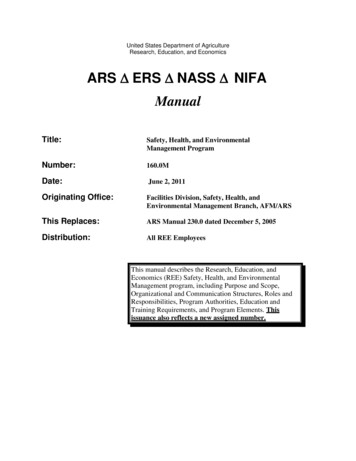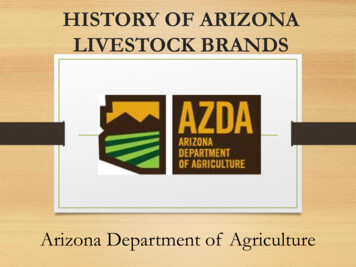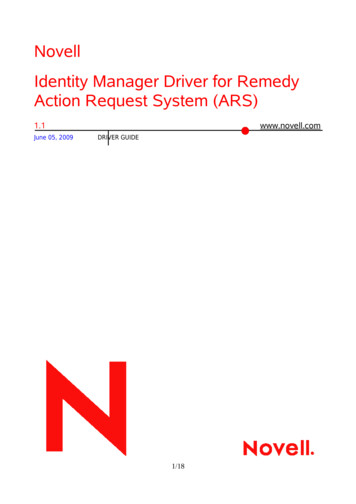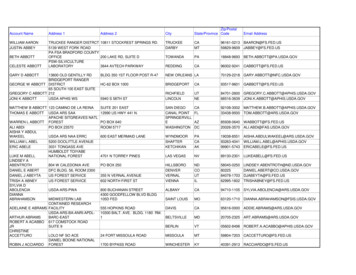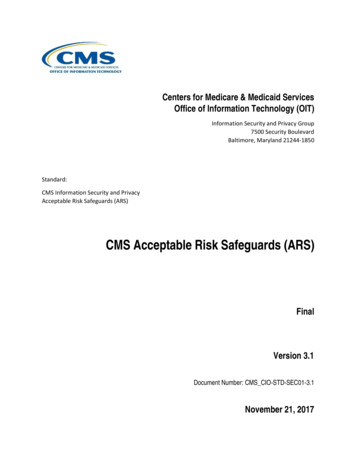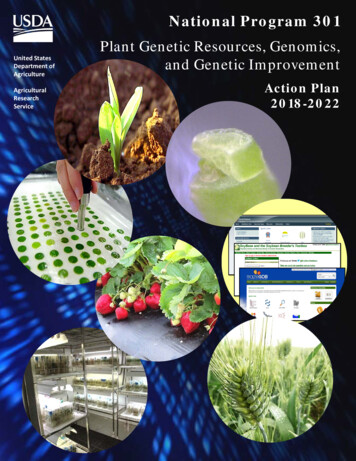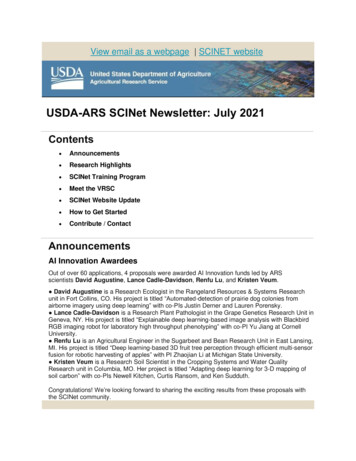
Transcription
View email as a webpage SCINET websiteUSDA-ARS SCINet Newsletter: July 2021Contents Announcements Research Highlights SCINet Training Program Meet the VRSC SCINet Website Update How to Get Started Contribute / ContactAnnouncementsAI Innovation AwardeesOut of over 60 applications, 4 proposals were awarded AI Innovation funds led by ARSscientists David Augustine, Lance Cadle-Davidson, Renfu Lu, and Kristen Veum. David Augustine is a Research Ecologist in the Rangeland Resources & Systems Researchunit in Fort Collins, CO. His project is titled “Automated-detection of prairie dog colonies fromairborne imagery using deep learning” with co-PIs Justin Derner and Lauren Porensky. Lance Cadle-Davidson is a Research Plant Pathologist in the Grape Genetics Research Unit inGeneva, NY. His project is titled “Explainable deep learning-based image analysis with BlackbirdRGB imaging robot for laboratory high throughput phenotyping” with co-PI Yu Jiang at CornellUniversity. Renfu Lu is an Agricultural Engineer in the Sugarbeet and Bean Research Unit in East Lansing,MI. His project is titled “Deep learning-based 3D fruit tree perception through efficient multi-sensorfusion for robotic harvesting of apples” with PI Zhaojian Li at Michigan State University. Kristen Veum is a Research Soil Scientist in the Cropping Systems and Water QualityResearch unit in Columbia, MO. Her project is titled “Adapting deep learning for 3-D mapping ofsoil carbon” with co-PIs Newell Kitchen, Curtis Ransom, and Ken Sudduth.Congratulations! We’re looking forward to sharing the exciting results from these proposals withthe SCINet community.
SCINet Corner: Third Thursdays of the MonthSCINet Corner is a VRSC-moderated virtual space for people to share knowledge, discussprojects, and identify resources needed to progress on their projects. The next event is on July15th (10am PDT, 11am MDT, 12pm CDT, 1pm EDT). Participants are encouraged to shareinformation on tutorials, conferences, and other upcoming SCINet training opportunities. It isrecommended to join the event via Google Chrome or Firefox. Together, we discuss ideas,problems, and form collaborations to address your questions. Where: spatial chat link sent out the Monday before and the night before Register: https://forms.gle/7DcBoBvbGcjQDBP38SCINet ForumRegister your SCINet Forum account at https://forum.scinet.usda.gov today! SCINet’s newdiscussion forum provides better discussion, search, and control of what emails you receive.Need help installing or troubleshooting software? Need help with login or account info?The first time you visit, select "Sign Up" and you will be asked to log in with your existingSCINet account login and two-factor authentication credentials (what you use to log in to Ceresor Atlas). For instance: if your SCINet Password is "Password" and your Verification Code is"123456", then enter "Password123456". Once you log in, visit here for basic Forum usage.Applications to become a SCINet fellow postedThere are 13 opportunities posted through ORISE to become a SCINet fellow--please sharewith your networks! Three positions require a Master's degree and 10 require a Ph.D. For moreinformation on the positions including deadlines and potential start dates,visit: https://www.zintellect.com/Catalog and enter the keyword: SCINetResearch Highlights
SCINet HPC resources, PacBio software, and a new assembly program has allowed ARSresearchers in Ag100Pest to assemble the large genomes of the American and Desert locusts.Locusts are dangerous and widespread pests that threaten global food security. Assemblinglocust genomes allows us to better understand their behavior and physiology. Locust genomesare large--3 times larger than human or bovine genomes--requiring SCINet computingresources. Initial assembly took just over a day, much faster than the several weeks to monthsrequired when Ag100Pest began.SCINet Training ProgramSCINet-funded TrainingIntroduction to Atlas July 15 (10-11:30 AM CDT): During the month of July, Mississippi StateUniversity is offering a new training course for USDA-ARS scientists. Introduction to Atlas isa 90-minute information session for anyone interested in learning more about USDA’s newstate-of-the art supercomputer Atlas. Atlas is a high-performance computer with 101 terabytesof total RAM designed to help power research advances in biocomputing, epidemiology,geospatial technology and more. This introduction will cover a range of topics that includeeverything from a general overview of high-performance computing and why you might want totake advantage of its capabilities in your research to basic protocols associated with usingAtlas (how to gain access to Atlas, how to log-in to your account, how to transfer data, etc.).This introduction session will be led by Dr. Adam Thrash, MSU Research Associate andComputer Specialist with MSU’s Institute of Genomics, Biocomputing, and Biotechnology.Along with Introduction to Atlas, a Blockchain Networks workshop occurred on July 6 and7. Those interested in attending Introduction to Atlas must register in advance. Forquestions regarding training courses, please contact Dixie Cartwright.The Carpentries R and Python Workshops: Multi-day online software and data Carpentryworkshops co-sponsored by SCINet and The Carpentries will be posted on the UpcomingSCINet Events webpage. Workshop topics included Unix, Git, and Intro to R or Python, data
organization and cleaning. To join the priority list for the next round of Carpentries workshops,contact Kathy Yeater. The Carpentries instructor training is available to qualified applicants who desire tobecome certified Carpentries workshop instructors. This training teaches participantsThe Carpentries pedagogy and provides the resources to instruct Carpentriesworkshops in Unix, git, SQL, OpenRefine, R, Python, and more. Contact Kathy Yeaterfor more information about Instructor Training.Coursera.org Certified Courses: The SCINet Initiative and the AI Center of Excellence areexcited to provide training opportunities through Coursera. A limited number of Courseralicenses are available to ARS scientists and support staff to complete training focused onscientific computing and artificial intelligence. Successful completion of courses andspecializations will result in widely recognized certificates and credentials. The applicationdeadline for the next round of licenses is July 15th. Please visit the CourseraTraining page of the SCINet website for more details about the program and applicationprocess.Free Online Computational Training (Self-paced)Make use of your work-from-home time with computational training! A large list of free tutorialsand courses has been compiled on the Free Online Training page. Training topic areas includePython, R, SAS, and MATLAB programming; statistics; data science concepts; AI and machinelearning; GIS; Google Earth Engine; Git and GitHub; reproducibility, productivity, andintegration management tools; and bioinformatics and ecology domain learning. Know ofadditional free training opportunities? Send them to SCINet-Newsletter@usda.gov.SCINet Online Science TutorialsBrowse our growing set of SCINet science tutorials created by ARS scientists and the SCINetVirtual Research Support Core. Our ARS Science Tutorials page includes Ceres Onboardingand Intro to Unix for new HPC users, two geospatial computing tutorials, a QTL Analysistutorial for sequencing in R, and machine learning training material. These tutorials are beingfurther developed and organized in the Bioinformatics Workbook and the GeospatialWorkbook--new content is welcome.Meet the VRSCThe SCINet Virtual Research Support Core (VRSC) manages the day-to-day operations andmaintenance of the SCINet HPC systems and is also involved with the networking aspects ofSCINet. The VRSC is staffed by talented IT administrators and engineers with expertise inhigh-performance computing system and network engineering, operations, maintenance, andadministration. Additionally, the VRSC provides research IT support, computational expertisein various research domains, and support for SCINet-funded workshops/training for SCINetusers. In the previous issue, we introduced the VRSC for Ceres: Jim Coyle, Marina Kraeva,David Orman, and Andrew Severin.In this issue, we’re introducing some of the VRSC personnel who facilitate the Atlas HPCsystem at Mississippi State University (MSU) in Starkville, Mississippi: RobertMoorhead, Bindu Nanduri, Trey Breckenridge, Joey Jones, Adam Thrash, and DixieCartwright.
Robert MoorheadDr. Robert Moorhead is the Director of the Geosystems ResearchInstitute (GRI), a university-level institute that focuses on understandingEarth's natural and managed systems. GRI addresses spatialtechnology, visualization of complex datasets, and computationalmodeling in agriculture, forestry, water resources, climate, weather, andoceanography. He is the PI of the AAR-HPC award. He has worked forMSU for 32 years, initially as an assistant professor in Electrical andComputer Engineering and now as the Director of two university-levelInstitutes. His research has migrated from image processing tovisualization of large-scale computer simulations to most recently usingunmanned aerial systems for advancing agriculture performance and understanding theenvironment.Bindu NanduriDr. Bindu Nanduri is an Associate Professor with the College ofVeterinary Medicine at MSU. As a co-investigator on the AAR-HPCproject, she helps coordinate efforts to foster collaborative research withUSDA ARS and assists in the overall management of the project. Shehas worked at MSU for 18 years and her research includes genomics,bioinformatics, and infectious diseases. Bindu works with the projectteam to develop novel methods to integrate data from disparatedomains such as genomics, spatial epidemiology, machine learning,and agricultural operations, in a HPC environment. She is excited aboutbuilding a multidisciplinary research hub at MSU that will have a longterm impact on agricultural research and is looking forward to thetraining opportunities.Trey BreckenridgeTrey Breckenridge is the Director of High-Performance Computing atMSU’s High-Performance Computing Collaboratory (HPC2), where heis responsible for the oversight of computing, data storage, datacommunications, and general operations. He has over 25 years ofprofessional experience in high performance computing and computersupport.Joey Jones
Joey Jones is a Senior Computer Specialist with the MSUHPC2 Computing Office. He has been with the HPC2 for 20years, focusing primarily on High Performance Computingadministration, as well as other system administration tasks.One of the greatest perks of his work is seeing theaccomplishments and advances created on the machines thathe and his team manage.Vincent SandersVincent Sanders is the Computing Systems Manager at MSU HPC2. Heis a MSU graduate where he obtained a Bachelor's in ElectricalEngineering (1990) and a Master’s in Electrical Engineering (1992).After graduation he joined the MSU Microsystems PrototypingLaboratory (MPL) where he continued his research in hardwaremodeling and simulation of components and systems. He then joinedthe HPC2's Computing Office working on various projects focusing onhigh-performance computing management. He has over 25 years ofprofessional experience in high-performance computing and computer management. He iscurrently responsible for the oversight of computing, storage, networking, and highperformance computing operations at the HPC2.Adam ThrashDr. Adam Thrash is a computer specialist at the Institute for Genomics,Biocomputing & Biotechnology. Adam has a Ph.D. in computer science,an M.S. in computer science, and a B.S. in software engineering. Heprovides expertise in working with bioinformatics software to the AARHPC project, with a special interest in developing new softwaredesigned with HPC and user-friendliness in mind. Adam also enjoys thechallenge of explaining complicated concepts in understandable ways,whether through developing visualizations of large datasets or workingto create training courses for Atlas.Dixie Cartwright
Dixie Cartwright is the Training and External Facilitator with theGeosystems Research Institute at MSU. She works with the AAR-HPCproject team to help coordinate training courses and outreach efforts.She has worked for MSU for 17 years in a variety of professional rolesrelated to distance and continuing education. She enjoys theopportunity this work gives her to meet and work with so many greatpeople. Dixie is looking forward to working with the project team todevelop new virtual and online training courses in the coming monthsand being able to offer some in-person workshops at MSU by the end ofthe year.SCINet Website UpdateNew content is constantly being added to the SCINet website. Please send any websitefeedback to SCINet-Newsletter@usda.gov.
How to Get StartedSimply request a SCINet account (eAuthentication required) to getstarted. Upon approval, you will receive instructions for logging intoSCINet and accessing Basecamp.Check out the SCINet website for more info on how SCINet canenable your research.Read the SCINet FAQs covering general info, accounts/login,software, storage, data transfer, support/policy/O&M, parallelcomputing, and technical issues.Contribute / ContactFor questions about this newsletter, to contribute content, feedback on the SCINet website, orSCINet policy and development questions please email SCINet-Newsletter@usda.gov.SCINet Newsletter Editor: Amy HudsonFor technical assistance with your SCINet account, please email scinet vrsc@usda.gov.SCINet Leadership TeamDeb Peters, Acting Chief Science Information OfficerRob Butler, Acting SCINet Project ManagerAdam Rivers, Science Advisory Committee (SAC) ChairBrian Scheffler and Stan Kosecki, Ex OfficioSCINet Website CommentsStay Connected with the USDA Agricultural Research Service5601 Sunnyside Avenue, Beltsville, MD 20705
Introduction to Atlas July 15 (10-11:30 AM CDT): During the month of July, Mississippi State University is offering a new training course for USDA-ARS scientists. Introduction to Atlas is a 90-minute information session for anyone interested in learning more about USDA's new state-of-the art supercomputer Atlas.


